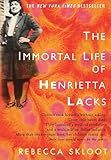 I first heard about The Immortal Life of Henrietta Lacks when it first came out in 2010. The idea of a woman whose cancer cells were “immortal” was intriguing, especially when I learned her family members have not only received no compensation from this medical miracle, but they can’t get health insurance. I added it to my “TBR” list and thought about it from time time, even going so far as downloading it from the library, but it wasn’t until my library book club selected the book for their April pick that I finally listened to the book.
I first heard about The Immortal Life of Henrietta Lacks when it first came out in 2010. The idea of a woman whose cancer cells were “immortal” was intriguing, especially when I learned her family members have not only received no compensation from this medical miracle, but they can’t get health insurance. I added it to my “TBR” list and thought about it from time time, even going so far as downloading it from the library, but it wasn’t until my library book club selected the book for their April pick that I finally listened to the book.
Rebecca Skloot spent 10 years and countless amounts of her own money on the story of Henrietta Lacks. While taking a community college class at the age of 16, Skloot learned about HeLa cells, prompting her to want to know more about the person behind those cells. HeLa cells, pronounced hee-la, were taken from Henrietta Lacks without her knowledge or consent, something that was common in the 1950s when Henrietta was diagnosed with cervical cancer. Dr. George Gey, a scientist working at Johns Hopkins, gathered cells from as many patients as possible, attempting to grow cells under culture. A combination of factors, including several sexually transmitted diseases, caused Henrietta’s cells to grow under culture, something that had never happened before or been repeated since. Her cells helped create the cure for polio, have been sent to space, and are so tenacious they must be kept secluded or they will contaminate other cells.
What started out as curiosity for Skloot turned into obsession. After finally getting contact information for the Lacks family, it took her years to break down the barriers they erected. Skloot initially received a positive response from Henrietta’s daughter Deborah, but was then blocked by the Lacks men – Henrietta’s husband, Dae, and sons Lawrence and Sonny. Skloot’s relationship with Deborah, who was a baby when her mother died, is as much a part of the story as the cells themselves, and she does a great job of balancing science with family history.
As I mentioned earlier, The Immortal Life of Henrietta Lacks was discussed by my library’s book club, and it was an interesting, at times heated, discussion. This biggest point in contention was whether Henrietta’s race or poverty were bigger contributing factors in the lack of recognition, monetary or otherwise, awarded to the Lacks family. While some people felt it’s a travesty that Henrietta’s husband and children couldn’t get health insurance, others wondered why they are any different from everyone else in this country, who should have access to affordable health care.
The Immortal Life of Henrietta Lacks is an important book that brings to light many issues related to healthcare and science and I am adding it to our 5 Star Reads.
Notes on the audiobook: Cassandra Campbell does an excellent job with the narrative, moving effortlessly from the scientific jargon to the family accounts. Non-fiction books can get dry and monotonous but the structure of the book kept the story moving. The audio version I listened to also had an interview with the author at the end of the book, which is always a welcome addition.
I probably need to listen to this on audio. It’s one I’ve been meaning to get to. In fact, I bought it for my dad last Christmas, thinking I’d borrow it back, but haven’t yet 🙂
Intriguing story but a layperson might ask whether, the cells being uniquely reproducing, they are in fact typical cancer cells. If not, what have doctors been studying these many years.
My bookclub also discussed this book, and it was indeed a lively discussion. It’s one of the things I love best about my bookclub — it causes me to pick up books I might otherwise never have thought of. This was a good one.